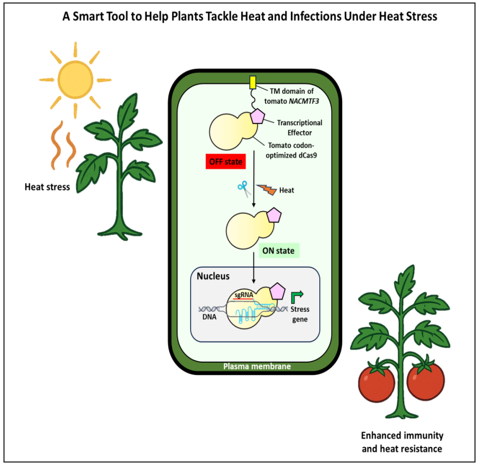CRISPR-Based Gene Switch for Climate-Resilient Agriculture

- 03 Jul 2025
In News:
Scientists at the Bose Institute, Kolkata, under the Department of Science and Technology (DST), have developed a modified CRISPR-based molecular tool to enhance plant resilience against heat stress and bacterial infections. The research is published in the International Journal of Biological Macromolecules.
What is the Innovation?
- The tool is a modified version of the CRISPR system called dCas9 (dead Cas9), which does not cut DNA.
- Instead, it functions as a stress-responsive gene switch, turning defense and heat-tolerance genes on or off only when the plant is under stress (e.g., high temperature or pathogen attack).
How Does It Work?
- The switch is held outside the plant cell’s nucleus using a tomato-derived protein domain (NACMTF3 TM domain).
- Under stress conditions, such as heat waves or bacterial infection, the tether is released.
- The dCas9 switch then enters the nucleus, activating genes that help the plant combat the stress.
Key Functional Genes Activated:
|
Gene |
Function |
|
CBP60g, SARD1 |
Activate immune response to bacterial infection (e.g., Pseudomonas syringae) |
|
NAC2, HSFA6b |
Enhance heat tolerance, retain water, and improve overall health |
Salient Features of the Tool:
- Non-invasive: Unlike traditional CRISPR, this version does not edit the DNA, making it safer and more acceptable.
- Energy-efficient: The switch is activated only when needed, minimizing unnecessary energy use by the plant.
- Dual Protection: Shields plants from both heat stress and pathogenic infections.
- Eco-friendly and crop-compatible: Based on naturally occurring proteins, tested successfully in tomato, potato, and tobacco.
Significance and Impact:
- Climate-Resilient Agriculture: Helps plants survive in rising temperatures and unpredictable weather.
- Food Security: Boosts productivity in solanaceous crops like tomato, potato, brinjal, and chilli.
- Smart Farming Solution: Offers a model for sustainable and precision agriculture globally.
- Global Applicability: Can be adapted to other food crops affected by climate change and disease outbreaks.
